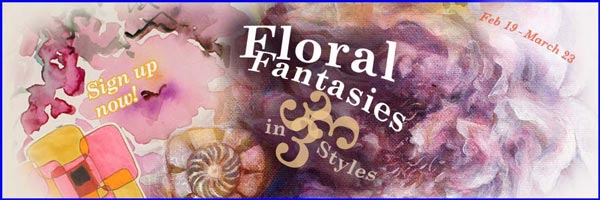Flowers and Jewels – New Free Tutorial for Subscribers!
I have been working with a 2-part tutorial about drawing flowers and jewels. Part 1 is now finished, and I am hoping to get Part 2 done before Christmas. Watch Part 1 now – Subscribe to my weekly emails to draw with me!
Loose Realism in Watercolor – 6 Tips for Expressive Floral Art
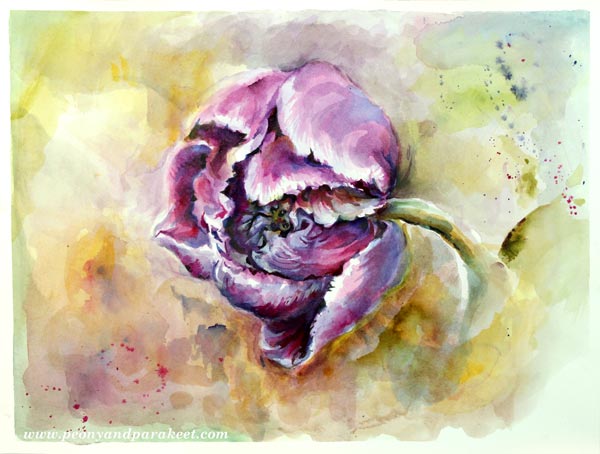
It is the last week to sign up for my floral art class, so I wanted to show why flowers are so inspirational to create and give tips for expressive floral art. In this blog post, I make a fairly quick watercolor painting that treats the flower as a miracle of its own rather than a boring stereotype. Because let’s admit, we have all drawn these:

Using reference photos or real flowers as a reference doesn’t help if we just try to build the bridge between the stereotype and the real thing. The result can be even stiffer and more boring.
But flowers are not boring at all! I picked one fairly modest tulip from a vase to show you how to highlight its beauty and create expressive floral art.
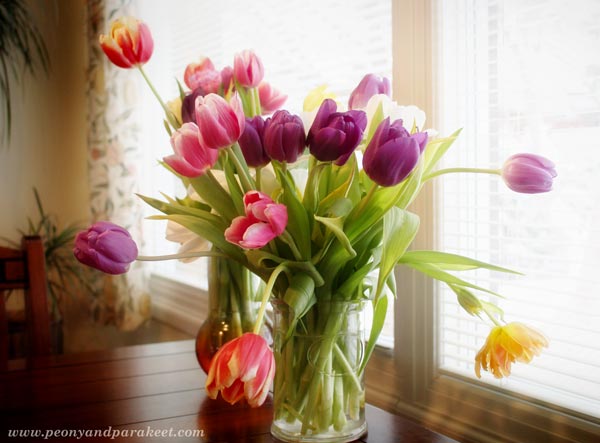
Here’s the setting:
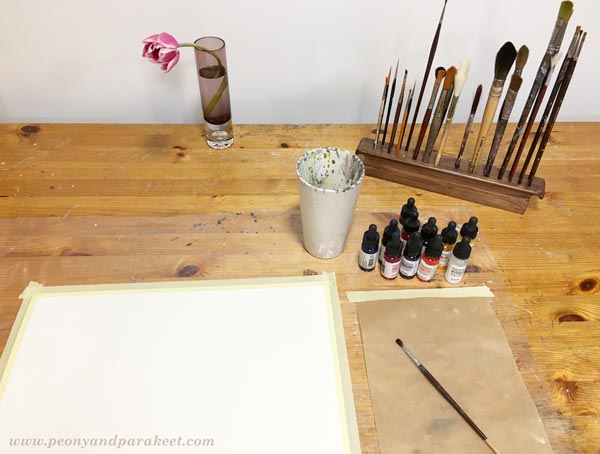
And here are my six tips:
1) Flowers are Never Solid-Colored
You don’t have to use a huge range of colors, but mixing them to get several tones is essential. Here are the colors that I used for this project, just seven, and I mostly used only two of them: blue (ultramarine) and pink (Quinacridone Magenta).
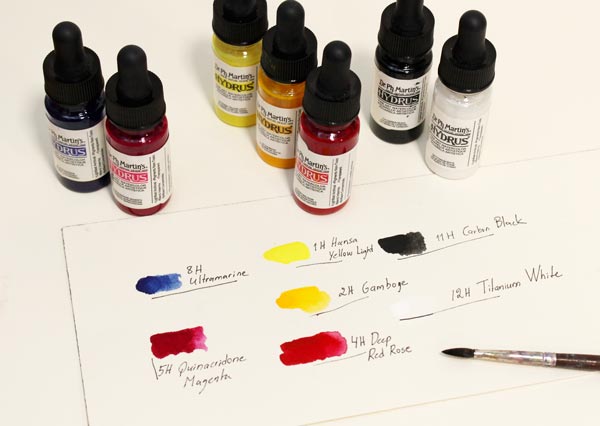
2) The Structure of a Flower is Always More Elaborate Than You Think
Accept that you don’t quite understand the structure of any flower. It is much more elaborate than you can ever imagine. So when painting realistically, don’t simplify what you see!
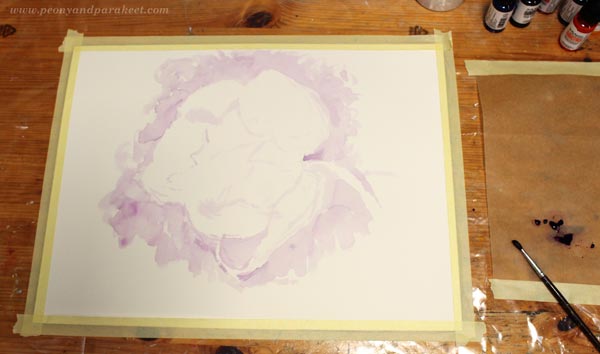
I began the painting by sketching the biggest petals with the mixture of blue and pink. Notice how pale my sketch is! In reality, it is even a bit paler, but I enhanced the photo so that you can see it more clearly. When painting with watercolors, it’s important to start with a very pale color so that you can fine-tune the painting as it progresses.
3) Flowers Have Strong Shadows
We usually connect flowers with light and light-weightedness and don’t want to use dark colors for them. But if you imagine being an ant living inside a flower, there are a lot of hiding places between the petals. Without those murky dens, bright plazas lose their shine, and the flower looks flat.
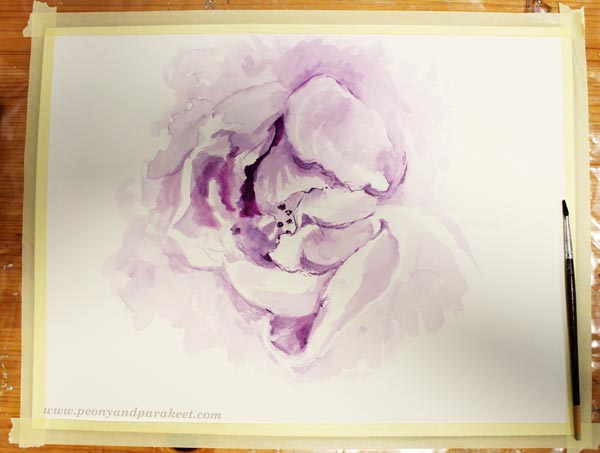
With the mixture of pink and blue, I continue by adding more shadows to the flower. The result is a bit like an underpainting (one of the techniques in the floral art class). It focuses on the lightness and darkness instead of the actual tones of color.
4) Flowers Are Full of Gently Flowing Streams
In general, flowers may look static but when expressing them with paint, take a different mindset! Every petal, shadow, bright spot, any detail, is a part of a dynamic, circulating and flowing stream.
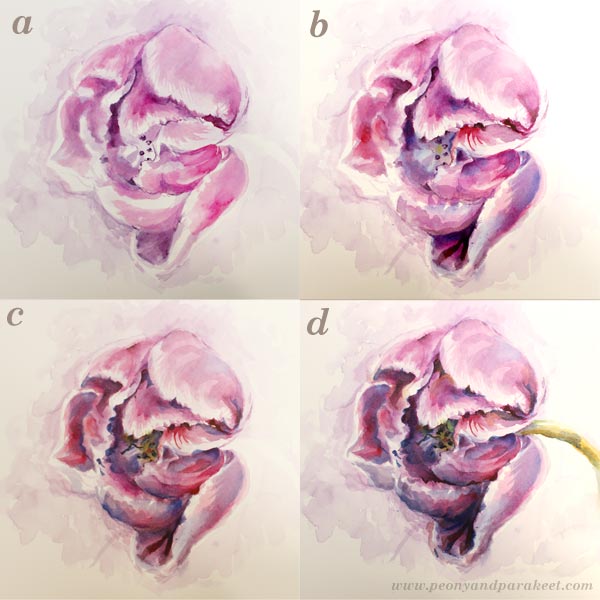
Instead of fixating to the big picture, I move from one detail to another and change them so that they are more curvy and organic.
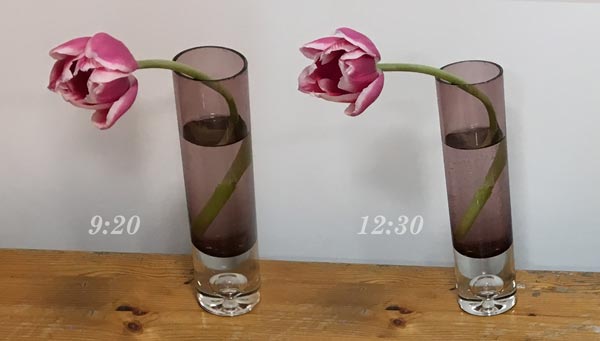
My tulip is not static either. The petals open with the daylight! It doesn’t bother me because I follow the streams of my painting more than the reference.
5) Flowers Are Never Separate from Their Surroundings
If you aim for a realistic look, don’t make the background too separate from the flower! In reality, colors interact with each other, and there are blurry reflections everywhere.
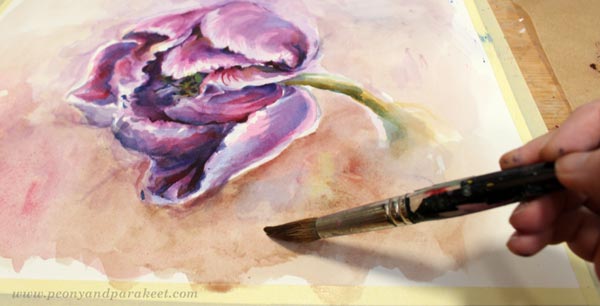
I mix some neutral colors for the background before finishing the flower. Then I go through all the details one more time, and finally paint and splash colors carelessly for the background.
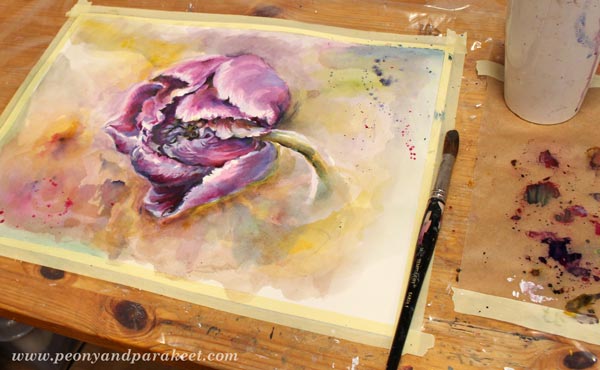
I use the same pink and blue in most of the color mixes than what I used for the flower. It makes the painting more unified.
6) Macro-Painting: Flowers Can Be Big!
When you want to give a realistic impression, don’t start with a tiny sketch! The smaller your flower is, the more difficult it becomes. My paper is 16 x 12 inches, and the flower is approximately 8 x 7 inches. I can easily think about creating a flower twice the size to get the details even more aesthetic.
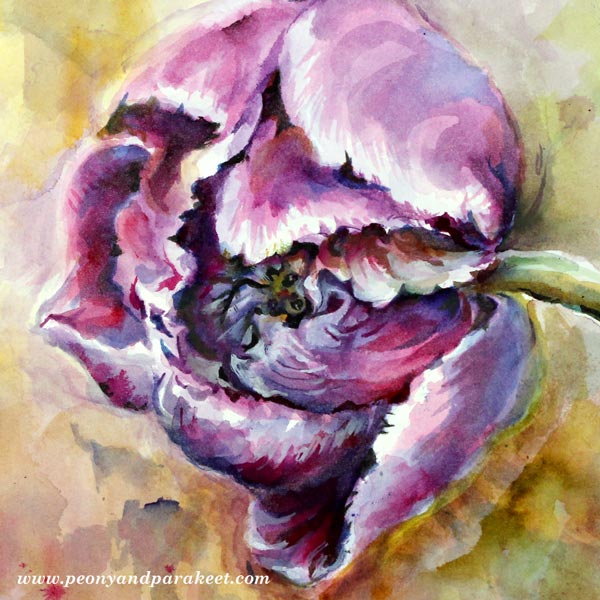
Floral Fantasies – Create Expressive Floral Art!
Stylish floral designs, abstract intuitive flowers, and loose realistic art may seem different, but they all use similar building blocks, just in a bit different way. In Floral Fantasies, you grow your imagination, expression, and technical skills by creating beautiful floral art together with like-minded art enthusiasts! I will show methods that make your art bloom and help you to finish your pieces so that the expression shines through.
Floral Fantasies in Three Styles
Level up your skills and let flowers show the way to expressive art!
The registration closes on Sunday midnight, Feb 18th (PST). Sign up here!
How to Add Depth when Creating Abstract Mixed Media Florals

When I started drawing and painting as an adult, it took quite a long time for me to understand the power of creating visual depth. Before that, every time I wanted to highlight a particular element, I added more lines to it and it just looked stiffer and stiffer. When you add depth, your art is not like a sentence where every word is underlined.
Instead, your art becomes more like a paragraph that invites the viewer to dig deeper.
How to Add Depth – Create with Me!
In the video, I create a floral painting without any reference photos and give you some basic tips along the way. I use a mixed media approach and combine pens with paints to make the job easier!
Come and Create Unique Floral Treasures!
Level up your skills, find the process you love and let flowers show the way to expressive art! You don’t want to miss this class!
Floral Fantasies in 3 Styles begins on Feb 19th – sign up now!
Flower Art Inspiration from the Students of Floral Fantasies
Today, you will see beautiful art from the students of Floral Fantasies in Three Styles!
In this online workshop, you play with three different approaches and pick the best from each of them.
Week 1 – Designs to Spark the Imagination
I think we all have browsed Instagram or Pinterest and found inspiring images from illustrators and pattern designers. In the first week, I show how to use flower photos to create simple designs that still look lively and unique. You will build designs from simple shapes and get inspiration from art nouveau, art deco, mid-century modern, and Scandinavian retro.
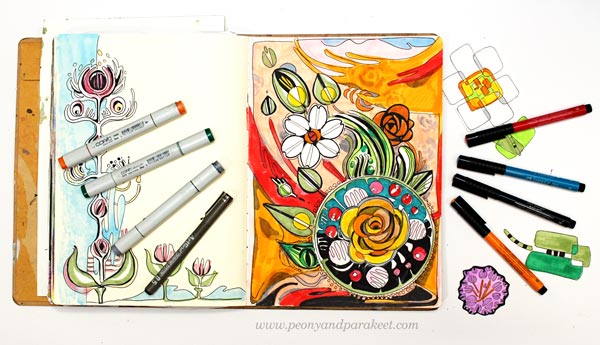
What I love about the students’ designs, is that they are all so original and express personality as well. I have included my favorite detail in the images.
Stephanie Carney:

Cathy Cale:
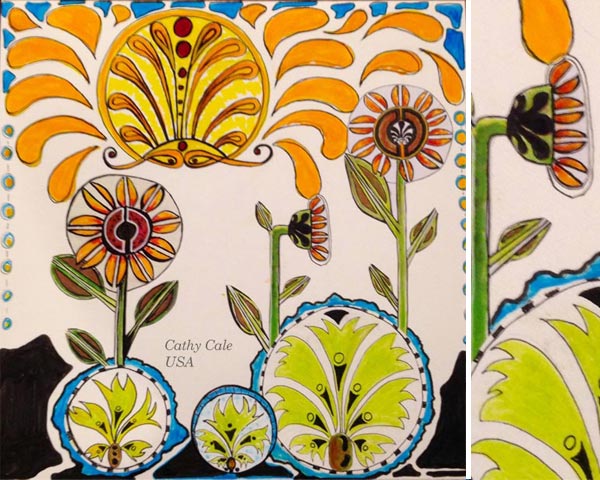
Diane Williams:
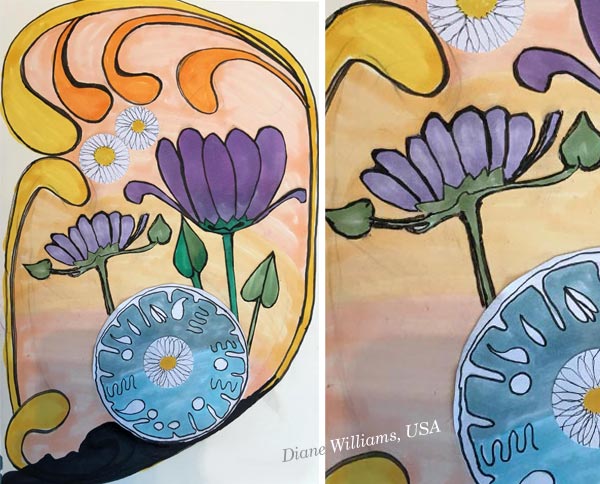
Jenny Baeta:
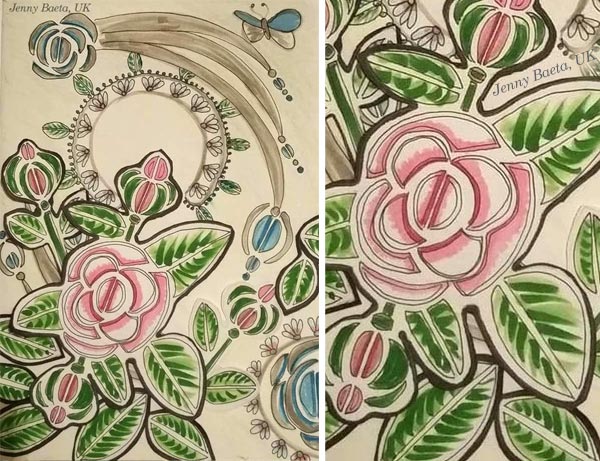
Gill Turner:
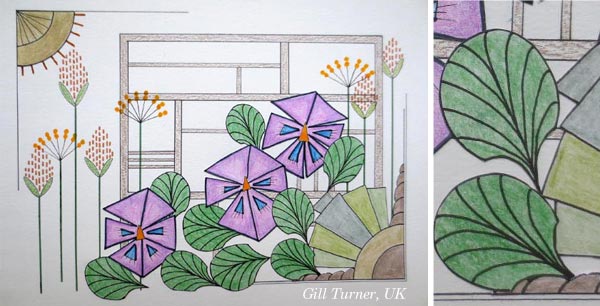
Nancy Kvorka:
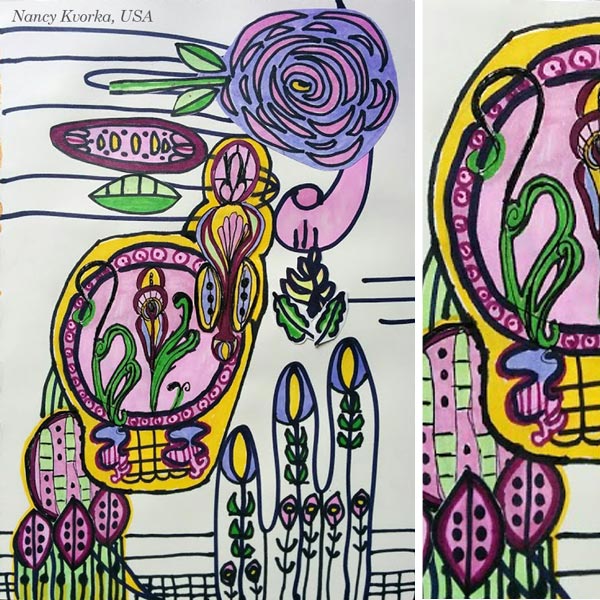
Week 2 – Watercolors to Bring Up Expression
In week 2, we go to a different direction but use the idea of simplifying as a foundation for painting intuitively. The best media for quick, intuitive painting is watercolors, of course!
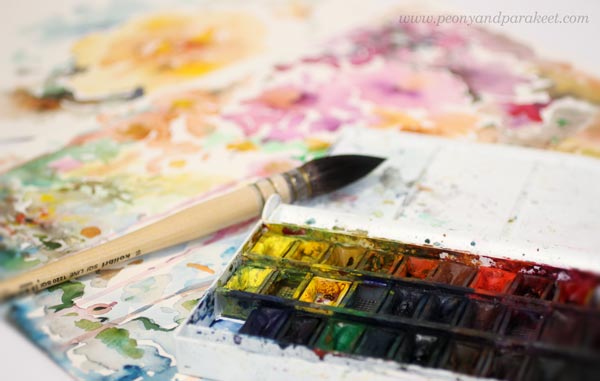
Tina Mitchell:
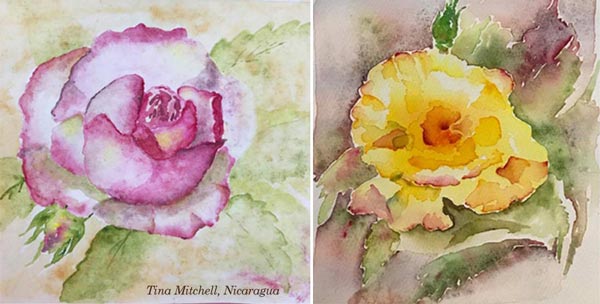
Darci Hayden:

Christy Tattersall:
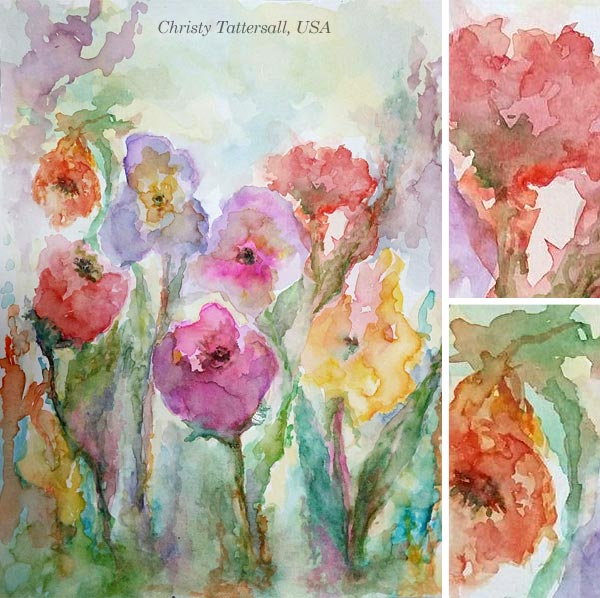
Wendy Holmgren:
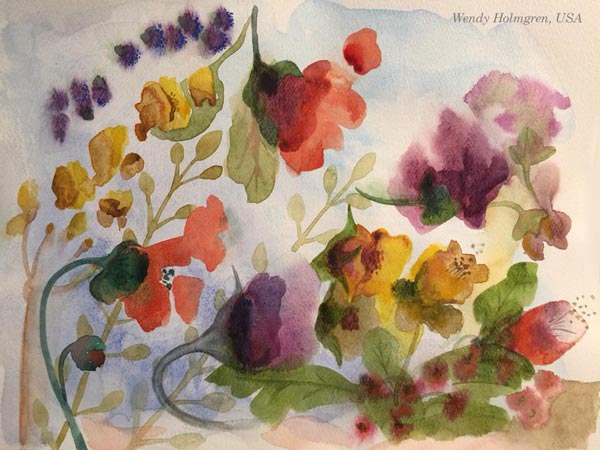
You can be less or more abstract when creating flowers with watercolors. You can adjust the theme to paint a still life, scene or landscape. See how Lisa Wright’s and Pirkko-Liisa Mannoja’s styles are different, yet both have their strengths.

There are so many different kinds of energy that you can express from quiet power to bubbling bursts, or maybe you want to splash boldly as Darci did in her piece.
Weeks 3 & 4 – Acrylics and Glazing Medium to Create Softness
In the next two weeks, we use all the things we have learned from watercolors as a new foundation for painting with acrylics. If you like to create quickly but get frustrated with the result, these weeks can be ground-breaking to you. Instead of rushing, you will calm down. You will see nuances and softness that you hadn’t noticed before. You will learn to use glazing medium so that it will make acrylic paints speak the language of flowers.
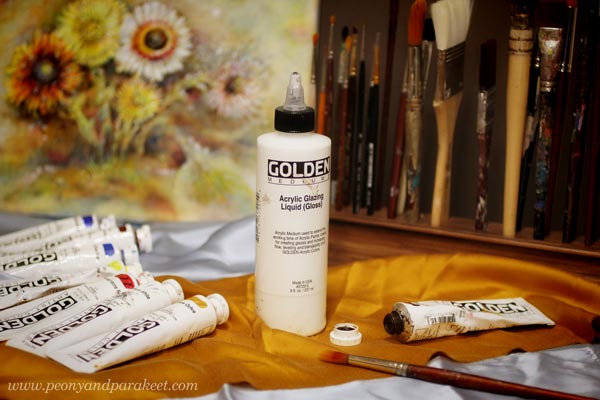
This old technique has many applications. You can use it for intuitive art, and it’s especially good for figurative painting. Practically most of the old pieces from the 16th to the 18th century use the technique with oil paints. I have adapted the technique to acrylic paints. I also have experience in oil painting so I can give you some tips if you prefer oils instead. These pieces created by students are made with acrylics and glazing medium.
The first layers are painted with umber and white. It’s called underpainting. Martha Winslow shows you an example of that:
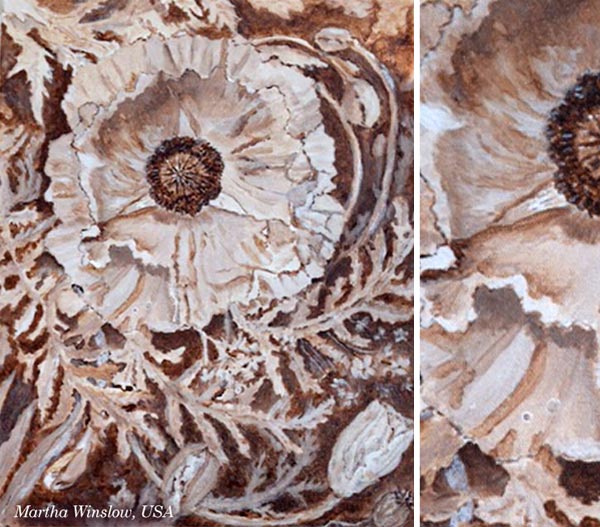
Mackie d’Arge’s underpainting and the painting after some color layers:
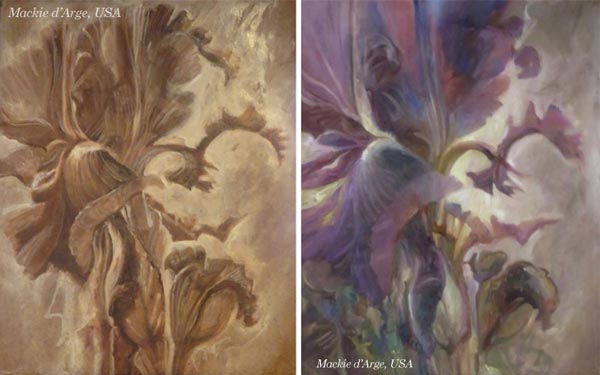
Susana Trew shows the softness I talked about earlier:

Leena Meinilä’s piece shows the romantic approach with glowing details that was popular in Renaissance:
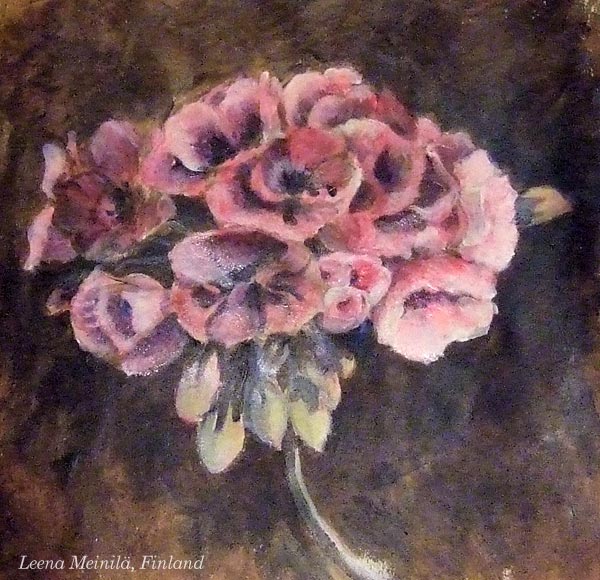
Marie Jerred shows how you can still play with colors even if you are painting like old masters:
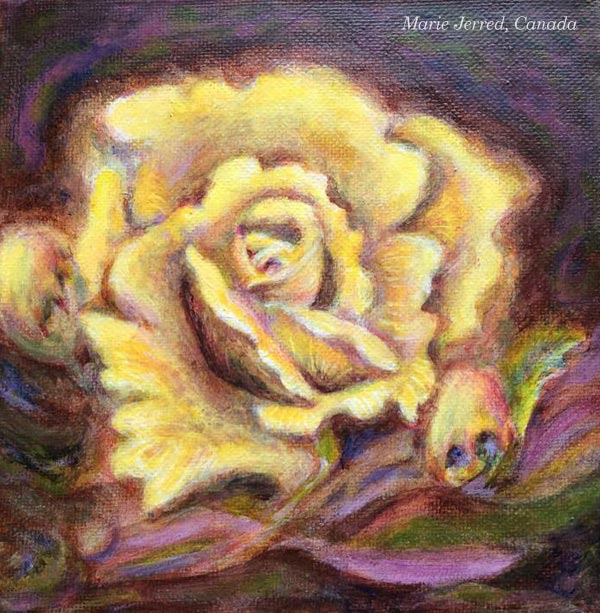
Paula Snyder said about the class: “The old masters portion was earth shaking for me. Really good material I’ll use all my life. I feel like I am turning a corner in my artistic growth.”
See how her painting is full of delicacy in shapes and colors, and still so captivating in simplicity.
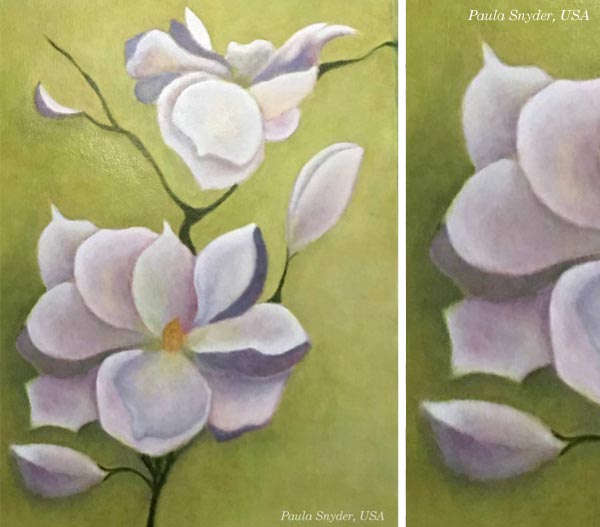
Many contemporary painters use this old technique, especially the underpainting part. It helps you to get away from the flat look, and bring depth and 3-dimensional impression to your work. Wendy Holmgren’s flower is a beautiful example:
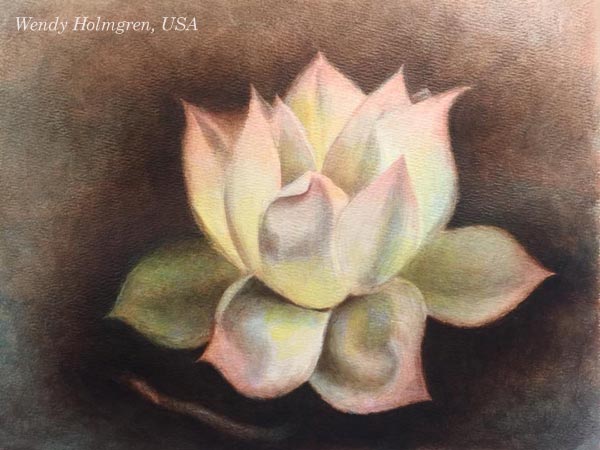
Marion Berkhout said: “I found a way of working which I didn’t expect at all. And it gave me the confidence to trust myself in art. The class gave me the opportunity to develop myself as an artist and learn new skills.”
Marion’s painting takes the old technique to the contemporary era:

Come and Create Your Floral Treasures!
Floral Fantasies in 3 Styles begins on Feb 19th, and the early-bird registration closes this week. Get the reduced price – sign up now!
More Art Inspiration – Join the Free Webinar too!
Tomorrow, I will broadcast live from my studio in Finland and talk about finding your visual voice. Welcome to the webinar! >> Save your spot here
The webinar will be recorded. If you save your spot, you can also watch the replay later!

